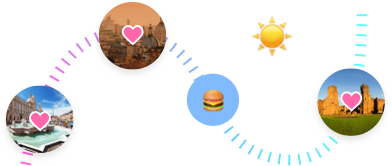



Nepal has a beautiful, fascinating, long history. The Nepalese are incredibly friendly and fun: learn a bit of Nepali and they will love you for it. Nepal is a mecca for outdoorsy type travelers because of the Himalayan mountains that offer up some of the best trekking opportunities in Asia. In fact, Nepal boasts eight of the 10 highest peaks in the world: companion to nearly every moment in the country.
Trekking or hiking alone is dangerous for a number of reasons. You may also want to hire a guide, as the woods and mountain areas can be tricky and getting lost or injured is a real risk. If mountain climbing is on your itinerary, be aware of and prepared for the possibility of altitude sickness and frost bite. Dress accordingly and don‘t take on more than you can handle. Carry the lightest pack possible and leave behind all the nonessentials. Some trekkers will pay their porters to carry a heavier load and this is poor practice. The porters may accept the extra fee, but they are risking their livelihoods by trekking overloaded. Trekkers should also plan on keeping their waste to an absolute minimum.
The Nepalese are a spiritual people. Visiting the temples, stupas, and religious sites is a clear highlight to any trip to Nepal, but keep in mind a few behavior best-practices. Show respect by dressing conservatively on any day that you plan to visit temples and religious sites. Although you should generally dress conservatively around the country too, this is doubly important at holy sites. Women should cover their shoulders and knees. Men should wear pants or long shorts and no singlets; also ensure your shirts have sleeves. Be respectful with your camera; you are not allowed to take photos inside of many temples. If you are unsure, ask first. Remove your shoes before entering temples, and never point your feet at the altar, nor should you step over people.
First and foremost, you‘ll want to know how to greet the locals. The traditional manner of greeting in Nepal involves placing your palms together in a prayer style and saying "namaste" or "namaskar". Address anyone older than you with respect using the terms "dai" for men and "didi" for women. And avoid stepping over someone‘s outstretched legs or touching anyone with your feet as these are considered impolite. If you are lucky enough to be invited into a Nepali home, remember to remove your shoes before entering. At dinner time, you must always wash your hands and mouth before eating.
If you plan on staying in Nepal for a while, you may want to pack a boiling pan and filter for the tap water. Water from the tap is not safe for consumption, even if it‘s from your hotel. Remember also to avoid fruit that may have been washed in contaminated water or drinking soft drinks with ice in them, as the ice may have been made from tap water. Stick to bottled water, which can be found in just about every store in the country.
There are power cuts in Nepal that can reach up to 14 hours per day. Come prepared with at least one headlamp and several extra batteries!